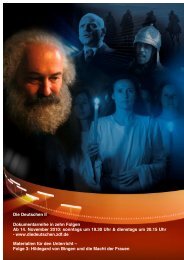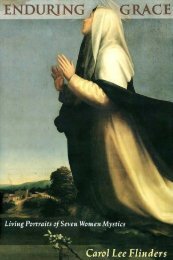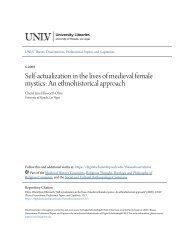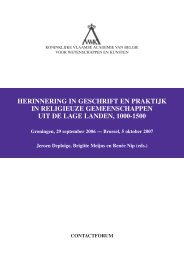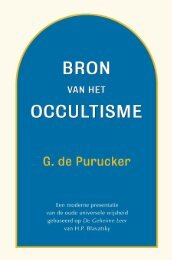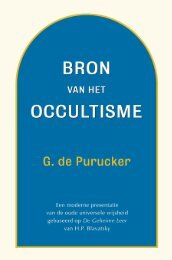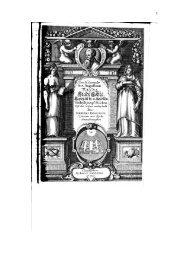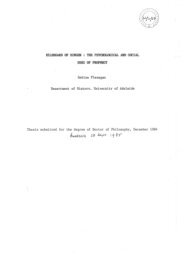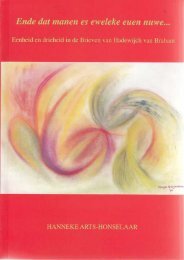A Companion to Hildegard of Bingen
Beverly Mayne Kienzle, Debra L. Stoudt & George Ferzoco, "A Companion to Hildegard of Bingen". BRILL, Leiden - Boston, 2014.
Beverly Mayne Kienzle, Debra L. Stoudt & George Ferzoco, "A Companion to Hildegard of Bingen". BRILL, Leiden - Boston, 2014.
- TAGS
- hildegard-of-bingen
You also want an ePaper? Increase the reach of your titles
YUMPU automatically turns print PDFs into web optimized ePapers that Google loves.
hildegard, the schools, and their critics 117<br />
have been written shortly after the council, during which Odo had heard<br />
reports <strong>of</strong> <strong>Hildegard</strong> and resolved <strong>to</strong> get her opinion <strong>of</strong> the council’s decision.<br />
Yet in Odo’s letter there is no essential connection <strong>to</strong> the council.<br />
He does not mention Gilbert’s name, nor does he suggest that he has a<br />
particular individual’s doctrine in mind, but rather states that “a large<br />
number <strong>of</strong> people” support the proposition. This idea is found as early<br />
as 1136, and it may not have been Gilbert’s invention at all.36 Further, as<br />
the research <strong>of</strong> Nikolaus Häring has shown, support for Gilbert’s position<br />
did not immediately end after the council, despite his promise <strong>of</strong> emendation.37<br />
One <strong>of</strong> Gilbert’s disciples, in fact, spent 30 years visiting libraries<br />
all over the world trying <strong>to</strong> fijind some authoritative patristic source for the<br />
quicquid in Deo dictum used <strong>to</strong> condemn him at Reims.38 One <strong>of</strong> the most<br />
prominent <strong>of</strong> the anti-Gilbertine polemics was written by Ge<strong>of</strong>ffrey <strong>of</strong> Auxerre<br />
after Gilbert’s death in 1154.39 Another polemic against Gilbert’s position<br />
was written by Clarembald <strong>of</strong> Arras (d. c.1187), certainly after Reims<br />
and probably in the 1150s.40 After 1185, the former disciple <strong>of</strong> Gilbert, the<br />
Cistercian Everard <strong>of</strong> Ypres, wrote <strong>to</strong> Pope Urban III: “At Paris and elsewhere,<br />
. . . some people say, ‘Paternity is God’; others say, ‘Paternity is not<br />
God.’”41 While the Gilbertine Everard prefers the latter position, he wants<br />
Van Acker, however, left open the possibility <strong>of</strong> a later date; see his table in Epis<strong>to</strong>larium,<br />
III, p. 222.<br />
36 The doctrine can be found in the Sententiae varsavienses, written before 1136 and<br />
edited by Friedrich Stegmüller, “Sententiae varsavienses. Ein neugefundenes Sentenzenwerk<br />
unter dem Einfluss des Anselm von Laon und des Peter Abaelard,” Divus Thomas 45<br />
(1942): 335–37. Stegmüller argues that the text refers <strong>to</strong> the doctrines <strong>of</strong> Gilbertus Universalis,<br />
who was accused by Abelard <strong>of</strong> holding a similar position. See David Luscombe, The<br />
School <strong>of</strong> Peter Abelard: The Influence <strong>of</strong> Abelard’s Thought in the Early Scholastic Period<br />
(Cambridge, 1969), pp. 179–80.<br />
37 On the difffijicult question as <strong>to</strong> whether Gilbert ever even actually said this in the fijirst<br />
place, see Nikolaus Häring, “The Case <strong>of</strong> Gilbert de la Porrée Bishop <strong>of</strong> Poitiers (1142–1154),”<br />
Mediaeval Studies 13 (1951): 12–16.<br />
38 This was Adhemar <strong>of</strong> St-Ruf, and the s<strong>to</strong>ry is narrated in the Liber de vera philosophia<br />
(partial edition by Paul Fournier, “Un adversaire inconnu de saint Bernard et de Pierre<br />
Lombard. Notice sur un manuscrit provenant de la Grande-Chartreuse,” Bibliothèque de<br />
l’École des chartes 47 [1886], 394–417); see also Nikolaus Häring, “In Search <strong>of</strong> Adhemar’s<br />
Patristic Collection,” Mediaeval Studies 28 (1966): 336–46.<br />
39 For Ge<strong>of</strong>ffrey’s Libellus, see John <strong>of</strong> Salisbury, His<strong>to</strong>ria Pontifijicalis, ed. Reginald Poole<br />
(Oxford, 1927), p. 11; with Nikolaus Häring, “Notes on the Council and Consis<strong>to</strong>ry <strong>of</strong> Rheims<br />
(1148),” Medieval Studies 28 (1966): 51–52.<br />
40 This is the Altercatio inter Clarenbaldum et magistrum Gislebertum, ed. Nikolaus<br />
Häring, “Texts Concerning Gilbert <strong>of</strong> Poitiers,” Archives d’his<strong>to</strong>ire doctrinale et littéraire du<br />
moyen âge 37 (1970): 169–203.<br />
41 Everard <strong>of</strong> Ypres, Epis<strong>to</strong>la ad Urbanum papam III, ed. Jean Leclercq, “Textes sur<br />
Saint Bernard et Gilbert de la Porrée,” Mediaeval Studies 14 (1952): 114–15: “Parisius et<br />
alibi . . . inquiunt quidam: ‘Paternitas est Deus,’ alii: ‘Paternitas non est Deus.’” On Everard’s




